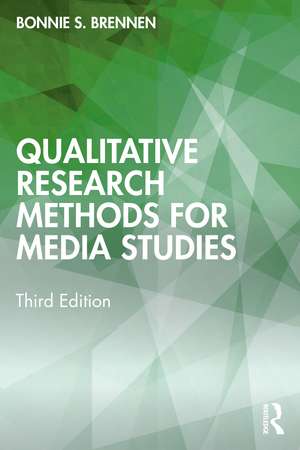Qualitative Research Methods for Media Studies
Autor Bonnie S. Brennenen Limba Engleză Paperback – 26 oct 2021
Each chapter features step-by-step instructions that integrate theory with practice, as well as a case study drawn from published research demonstrating best practices for media scholars. Readers will also find in-depth discussions of the challenges and ethical issues that may confront researchers using a qualitative approach. With new case studies and examples throughout, this third edition also includes updated and expanded material on digital technologies and platforms, how to perform social media research, how to analyze a variety of multimedia texts, and reflections on the use of big data.
A comprehensive and accessible guide for those hoping to explore this rich vein of research methodology, this book provides students and scholars with the all tools they need to be able to work in today’s convergent media environment.
| Toate formatele și edițiile | Preț | Express |
|---|---|---|
| Paperback (1) | 375.35 lei 3-5 săpt. | +16.13 lei 7-13 zile |
| Taylor & Francis – 26 oct 2021 | 375.35 lei 3-5 săpt. | +16.13 lei 7-13 zile |
| Hardback (1) | 990.06 lei 6-8 săpt. | |
| Taylor & Francis – 26 oct 2021 | 990.06 lei 6-8 săpt. |
Preț: 375.35 lei
Preț vechi: 407.99 lei
-8% Nou
Puncte Express: 563
Preț estimativ în valută:
71.86€ • 73.90$ • 59.61£
71.86€ • 73.90$ • 59.61£
Carte disponibilă
Livrare economică 29 ianuarie-12 februarie
Livrare express 15-21 ianuarie pentru 26.12 lei
Preluare comenzi: 021 569.72.76
Specificații
ISBN-13: 9780367641504
ISBN-10: 036764150X
Pagini: 264
Dimensiuni: 152 x 229 x 14 mm
Greutate: 0.32 kg
Ediția:Nouă
Editura: Taylor & Francis
Colecția Routledge
Locul publicării:Oxford, United Kingdom
ISBN-10: 036764150X
Pagini: 264
Dimensiuni: 152 x 229 x 14 mm
Greutate: 0.32 kg
Ediția:Nouă
Editura: Taylor & Francis
Colecția Routledge
Locul publicării:Oxford, United Kingdom
Public țintă
Postgraduate, Undergraduate, Undergraduate Advanced, and Undergraduate CoreCuprins
1. Getting Started 2. Doing Qualitative Research 3. Interviewing 4. Focus Groups 5. History 6. Oral History 7. Ethnography and Participant Observation 8. Textual Analysis
Notă biografică
Bonnie S. Brennen is Professor Emerita of Journalism and Media Studies at Marquette University and Editor-in-Chief of Journalism Practice. Her research addresses relationships between media, culture, technology and society. She is the author/editor of eight books and one novel, and her research has been published in edited books and academic journals. In October 2015 she was inducted into the University of Iowa School of Journalism and Mass Communication Hall of Fame.
Recenzii
PRAISE FOR THE SECOND EDITION
"Written in clear, jargon-free language, this remarkable and engaging textbook is extraordinarily valuable for beginners and experienced qualitative researchers. Brennen deftly makes complex concepts accessible and understandable, giving students the skills and the courage to undertake challenging research studies."
Margaret Duffy, Professor of Strategic Communication, Missouri School of Journalism, and Executive Director of the Novak Leadership Institute, USA
"Brennen covers the breadth of qualitative research in media studies thoroughly and accessibly, drawing on numerous examples to knit together the conceptual concerns of method with the practical experiences of research in action. This is a valuable text for both students new to research to learn the craft of qualitative research and for prompting even the most experienced researchers with helpful conceptual and practical reminders towards its best practices."
Jason Pridmore, Associate Professor of Media and Communication and Vice Dean of Education for the School of History, Culture and Communication, Erasmus University Rotterdam, Netherlands
"Written in clear, jargon-free language, this remarkable and engaging textbook is extraordinarily valuable for beginners and experienced qualitative researchers. Brennen deftly makes complex concepts accessible and understandable, giving students the skills and the courage to undertake challenging research studies."
Margaret Duffy, Professor of Strategic Communication, Missouri School of Journalism, and Executive Director of the Novak Leadership Institute, USA
"Brennen covers the breadth of qualitative research in media studies thoroughly and accessibly, drawing on numerous examples to knit together the conceptual concerns of method with the practical experiences of research in action. This is a valuable text for both students new to research to learn the craft of qualitative research and for prompting even the most experienced researchers with helpful conceptual and practical reminders towards its best practices."
Jason Pridmore, Associate Professor of Media and Communication and Vice Dean of Education for the School of History, Culture and Communication, Erasmus University Rotterdam, Netherlands
Descriere
This fully updated third edition provides students and researchers with the tools they need to perform critically engaged, theoretically informed research using methods that include interviewing, focus groups, historical research, oral histories, ethnography and participant observation, textual analysis and digital research.
